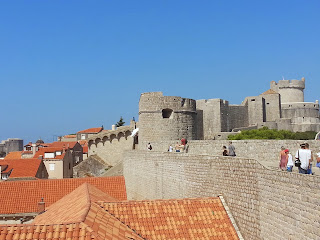I really don't want my blog to degenerate into one where I just post my backpacking pictures, despite the fact that I have a backlog of travel photographs that cry out to be put on my blog because I have not been updating regularly. So, today I shall risk putting things out of chronological order and write about something else. I hope nobody feels disturbed at this lack of continuity.
I have been raiding in WoW for as long as I can remember (actually, only since about 2007). I found the perfect guild for myself in 2011, a primarily Singaporean guild (already not exclusively so) with rules and directions that are in alignment with my own. I had the best time raiding through Firelands and Dragon Soul, and tried heroic raiding for the first time. Unfortunately, by the time Mists of Pandaria come around I will be in London, and the time-difference between London and Singapore, together with my post-graduate classes schedule, prevent me from raiding with them anymore. I tried finding another raid team - but most of them suck, especially if you are raiding on an Oceanic server at European times. I had to resign to the fate that I will not be raiding properly for Mists of Pandaria, until one of the guild leaders told me that the guild is stating a new team which will be raiding on weekends. That would be perfect for me, since I have no lessons on weekends and I can wake up at unearthly hours just to raid at Singapore time.
Most people see WoW raiding as some geekish, otaku-like activity, but they have no idea how challenging (and social) it is to form a good raid team. As a council teacher I can see the parallels between council and raiding (and indeed any kind of activity that requires teamwork, commitment, leadership and strive for excellence). If I could I would make all the councillors raid on WoW as part of their leadership training. Teamwork is ultimate in raiding - that is the whole idea of bringing together 10/25/40 people to down a raid boss - precisely because there is no way you can down the boss on your own. Expertise and knowledge is essential - you don't down a boss by haphazardly flinging your spells at him. Each person in the raid has to perform their specific roles, and yet be flexible enough to react on the fly when something goes wrong. Different bosses require different strategies, and the strategy which works for one group might not work with another depending on the raid composition and skill level of your team. The raid leader needs to know the fight inside-out, and also the strength and weaknesses of the players, unless he is prepared to wipe 50 times on a boss for the whole night and end up with no loot. There is human resource management - you need to deploy your people accordingly. There is conflict management - how are you going to convince 25 other skilled players that your strategy is going to work and they should listen to you and not try something funny. There is lots of drama - we are all busy people with limited time on our hands, and yet we want to see new content, down challenging bosses, and get fat lewt (loot). You want commitment from your team - a raid is not going to get very far if people don't show up on time or turn up unprepared. You want effort from your team - where everyone make sure their gear/ gems/ enchants are in tip-top condition, where everyone puts out the maximum amount of dps/healing that they can, etc. And conversely the team wants reward - if the raid makes unsatisfactory progress or a player deems it to be a waste of his precious time, he can find another guild with a more competent leader. And when everyone in the team has different commitment levels, objectives and priorities, holding a team together becomes a real challenge for the raid leader.
And there is plenty of drama in our team. The raid leader is the girlfriend of our tank (sigh, any kind of romantic relationship spells disaster in a professional team when people don't know how to act professionally). Most of the people in the team has little serious raiding experience and it seems like I was the only one with heroic raiding background. The atmosphere of the team is also too casual for my own liking - it was a valuable experience for myself as well - Having been a fairly serious raider all along, what I have assumed all along to be basic expectations from raid members turn out to be something which they consider to be excessively stringent -.- Well since I am not the raid leader I can only go along with whatever she decided (I soon realize she seldom decides on anything) while I continue to subtly work my influence in the group haha.
The first crisis came when we were stuck on Horridon. And the cause for our lack of progress was very apparent - a dps monk who SUCKS. I mean really SUCK. I can put out more dps than him as a healer. On top of that, he DOES NOT RESPOND to feedback. He doesn't talk on vent, he doesn't type anything in raid chat (except for the occasional OK), he doesn't react when we ask him if he understood the fight. The whole idea of the Horridon fight is that we need to control the adds to prevent them from overwhelming us, and only take out the boss towards the end - but he would be on the boss from the start to the end despite whatever we have said. To me - he has to be kicked out of the team, as simple as that. If he puts in the effort to learn and improve, then I might give him a chance, but he freaking hell does not even respond to whatever we say. The raid leader and the tank were soft-hearted - but to me, I am not going to spend week after week wiping on Horridon just because some idiot refuses to co-operate. And if this goes on pretty soon nobody wants to raid with this team anymore. The problem kind of solved itself when the monk decides to quit raiding (NO I did not force him. He couldn't have known that I was rolling my eyes in front of my laptop everytime he does something wrong). We found someone new (and better) and moved on.
The second crisis came when I realized that people were not putting on their best enchants and gems on their gear! Two years ago this would have been common respect and courtesy for the rest of your team mates. I come to a raid as prepared as I can be to give my best - because I don't want to waste other people's time when we wipe. And if you are having trouble getting the stuff, the guild is ever ready to help with gold, crafting gear, cutting gems, selling you cheap enchants etc. Imagine my wrath when I realize one of the healers uses the best enchant for his dps weapon, but just a mediocre enchant for his healing weapon. And that our tank uses a cheap gem because he is too cheapskate to fork out the gold. This kind of behaviour would result in an immediate warning from the guild leader, and if you don't listen, you will be replaced. But gosh our own raid co-leader is doing it. And worst of all, they question a pug (pick-up-group, gamer's lingo for someone you 'picked up', i.e. not a regular team member, when you are short of people) and ridiculed him when he was not fully enchanted. Double standards!
I asked point-blank whether we are going to enforce this as a basic requirement, and it was a shock to me that some of them do not consider it to be a basic requirement. Fine, I said, then don't blame me when I don't reforge/enchant/gem correctly when I get a new piece of loot. And then about a month later, I realized that our tank (who is a pally) got the legendary cloak for his monk toon before his pally toon! The legendary cloak is a painstaking investment - one that only comes after months of grinding. The fact that he spends more effort on his alt to get the cloak just reeks of selfishness. You are making your team mates work harder in order to cover your ass - for the simple reason that you would rather keep the cloak for another character that you are playing. How do you expect me to give my best when the tank is doing this and the raid leader condones it? (to be continued ...)





































